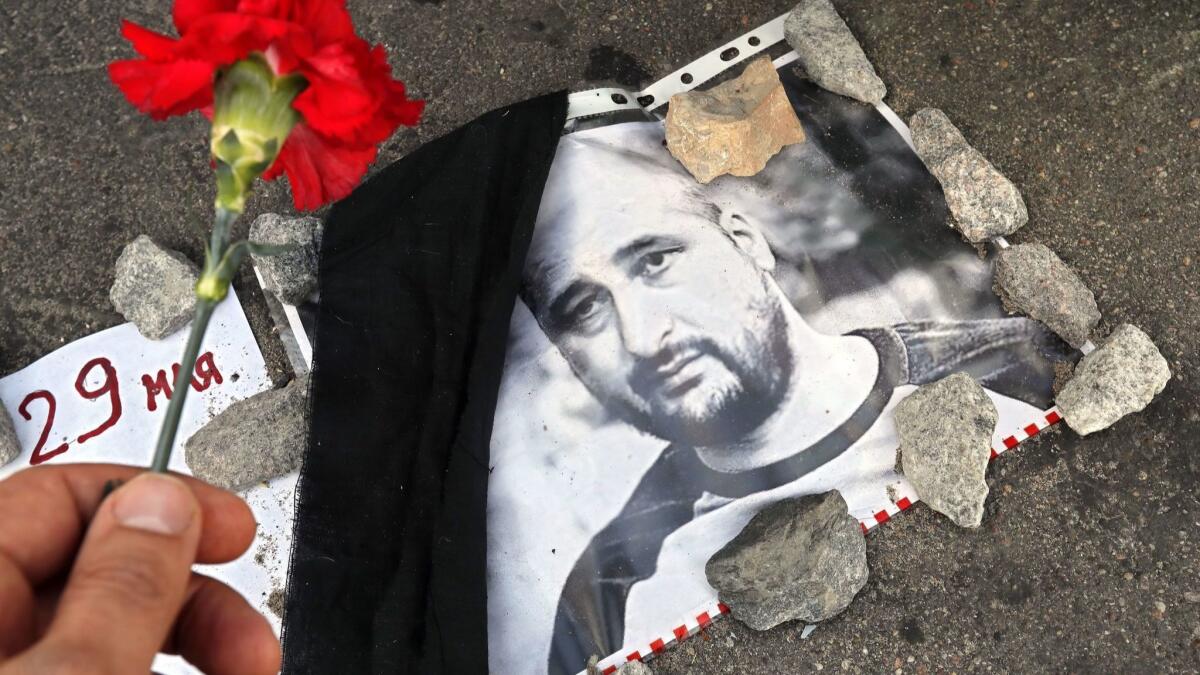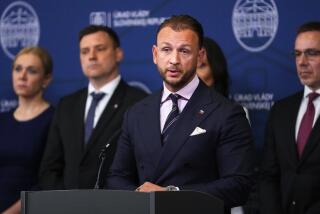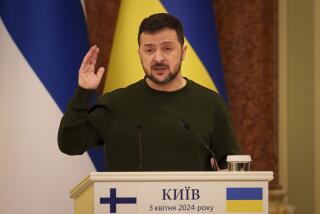Back from the dead, Russian journalist stuns colleagues by turning up in Ukraine as authorities describe sting

Reporting from Moscow — In a twist worthy of a Russian novel, a prominent Kremlin critic and journalist — whose purported slaying a day earlier in the Ukrainian capital had prompted a wave of grief and outrage — emerged alive and well Wednesday, with officials explaining they had mounted an elaborate sting to foil a death plot against him.
The journalist, 41-year-old Arkady Babchenko, apologized to all for the deception, first and foremost to his wife, Olga. Flanked by law enforcement officials at a news conference in Kiev, he said he had agreed to pose as his own corpse to give authorities their best chance to ensnare those who wanted him dead.
For the record:
6:05 p.m. May 30, 2018A previous version of this article described Ukraine as a former Russian republic. It has been changed to reflect that Ukraine, which was a Soviet republic, is Russia’s western neighbor.
The episode illustrated the climate of pervasive lawlessness in Ukraine, the volatile tensions between Russia and its western neighbor, and the ongoing danger to those who run afoul of the Kremlin.
But there was wide unease that the unusual decision to stage a journalist’s death could muddy the waters when it comes to claims and counterclaims about similar — real — cases. Kiev has been the scene of a number of unsolved killings of journalists and dissidents.
At the news conference, the head of the Ukrainian security service, Vasily Gritsak, said the agency hatched the operation after it became aware of an attempt to target the journalist, for which he blamed Russian authorities.
On Tuesday, police had reported that Babchenko, a veteran war correspondent who fled Russia and sought haven in Kiev last year, was shot multiple times outside his apartment and died en route to the hospital. The news conference on Wednesday drew a crowd of journalists who were expecting to be updated about the investigation into his killing.
The sight of Babchenko, speaking calmly and clad in a black hoodie, drew gasps and widened eyes among his colleagues that swiftly gave way to cheers and applause. He and authorities said that the plan to fake his death had been in place for more than a month.
Authorities said they arrested one person: a Ukrainian citizen they said was recruited by Russia to find and hire a contract killer. The price for the killing was $30,000, they said, with $10,000 more going to the intermediary.
But there was no explanation as to how exactly the suspect was flushed out, or how officials thought it would prevent planned attacks against Babchenko and others from going forward.
Russia responded with a show of disdain for the faked slaying, dismissing the assertion that it was behind a plot to kill Babchenko.
Maria Zakharova, spokeswoman for the Russian Foreign Ministry, posted on Facebook that the fact Babchenko was alive was “the best news” but decried the “propaganda effect” of the episode.
Whenever Russia has been blamed for high-profile attacks and other wrongdoing, the standard Kremlin playbook is to paint evidence against it as fake and accuse the West of whipping up anti-Russia hysteria.
Recent examples include the poisoning on British soil this year of former KGB spy Sergei Skirpal and his daughter, and the 2014 crash of Malaysia Airlines Flight 17, which was shot down over eastern Ukraine, killing 298 people. Moscow has vehemently denied involvement in either case.
Some advocacy groups fear this case could play into the hands of Russian officials when they claim innocence in attacks on journalists and other government critics.
The Committee to Protect Journalists said in a statement that although it was relieved that Babchenko was alive, Ukrainian authorities must “disclose what necessitated the extreme measure of staging news of the Russian journalist’s murder.”
Another prominent group, Reporters Without Borders, also voiced strong qualms.The group’s secretary-general, Christophe Deloire, called it a “new step of a war of information.”
“It is always very dangerous for a government to play with the facts, especially using journalists for their fake stories,” he wrote on Twitter.
Babchenko suggested that without the deception, the killing might have come to pass in reality. But it was unclear how or whether the ruse would shield him in the future.
“I buried friends and colleagues many times,” he said. “I know the sickening feeling.”
The case threw into sharp relief the tense relations between Russia and Ukraine, which are at their worst since the breakup of the Soviet Union in 1991. The two countries continue to battle each other in a brutal military campaign in eastern Ukraine near their shared border.
When Ukraine, a former Soviet republic that shares close cultural, historical and religious ties with neighboring Russia, ousted a pro-Moscow president during massive street demonstrations in 2014, the Kremlin responded by sending troops into the Crimean peninsula.
Moscow later annexed Crimea, a move Ukraine and the international community have never recognized. Fighting soon broke out in eastern Ukraine, where separatist rebels backed by Russia’s military battled against ill-equipped Ukrainian government troops and volunteer battalions.
The conflict during the last four years has been responsible for more than 10,000 deaths, mostly of civilians, and the displacement of more than 1.2 million people.
Nina Jankowicz, a fellow at the Washington-based Wilson Center who is writing a book on Russian disinformation campaigns, said the alleged plot against Babchenko could bolster backing for the Kiev government, which has been making slow progress in fighting graft and implementing democratic reforms.
“If Ukraine can show incontrovertible public proof that Russia was trying to kill someone on their soil, then that’s a game changer,” she said. “It could serve as a reminder that there’s a war going on there, to rallying international support around Ukraine.”
After initial euphoria at Babchenko’s Lazarus-like return, even some close colleagues questioned the tactic of a faked death. Petr Shelomovskiy, a Russian photographer and close friend of Babchenko, was on the phone with another journalist, grieving the death of a friend for whose safety they had long feared, when he learned of the ruse.
“You immediately feel like you’ve been fooled for nothing,” he said by telephone from his home in Prague, the Czech capital. “I know that his wife loves him very much, and even she didn’t know. I just wonder if he thinks this was important enough to do that.”
He also questioned whether the episode would intensify mistrust of government and security services. “The problem is that the Ukrainian police … we don’t trust at all,” Shelomovskiy said.
In the less than 24 hours that had elapsed since word of his “death,” tributes to Babchenko had poured in from around the world. A veteran of Russia’s savage war in Chechnya, he had been unsparing in his criticism of Russian military adventures elsewhere, including in Syria.
The deception, with television images of flashing lights as police milled about the scene of the supposed shooting and staged photos of his body, was a closely held secret. Without expressly saying that even his wife had been left in the dark, Babchenko apologized to her for the ordeal, using a diminutive of her name.
“Olechka, I am sorry,” he declared at the news conference. “But there were no options here.”
Special correspondent Ayres and Mirovalev reported from Moscow and Kiev, respectively, and Times staff writer King from Washington.
UPDATES:
2:20 p.m.: This article was updated with additional background.
1:00 p.m.: This article was updated with background, more Russian reaction, concerns raised about deception.
10:10 a.m.: This article was updated throughout with Times staff reporting.
This article was originally published at 7:35 a.m.
More to Read
Sign up for Essential California
The most important California stories and recommendations in your inbox every morning.
You may occasionally receive promotional content from the Los Angeles Times.










